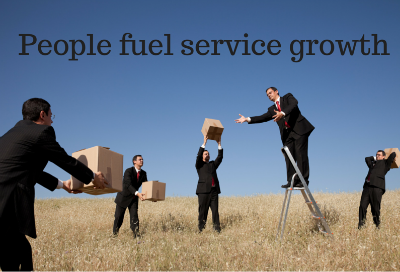Why Is Scaling A Service-Based Business So Difficult?
 I posed a question to the LinkedIn Inbound Networkers Group where I am a member. The question I was looking for feedback on was: How do you scale a service-based business? My question set off a pretty interesting and enlightening conversation, as you can see by all the comments here.
I posed a question to the LinkedIn Inbound Networkers Group where I am a member. The question I was looking for feedback on was: How do you scale a service-based business? My question set off a pretty interesting and enlightening conversation, as you can see by all the comments here.
I asked the question to get the thoughts of others. I had some ideas of my own on the subject, as I have been scaling an outsourced bookkeeping service for years. However, I wanted to get some feedback from more experienced business owners.
The question that I presented to the group served its purpose: I learned what other people thought about scaling a service business. So, I have come up with some thoughts on not only how to scale a service-based business, but also why it is so difficult to do so.
The Vision Of Scaling
One reason I believe people think that scaling a business is so difficult is because of the vision they have. Entrepreneurs tend to think big; it's kind of in their blood. Therefore, if they aim big and come up even a little short, they think they have failed. I think that the vision of what you are trying to scale your business toward is very important. Having that vision clear in your head will allow you to successfully scale your business. Knowing what you want is crucial. Carole Mahoney of Unbound Growth gave me some great feedback on the subject of understanding why you want to scale. Carole said:
"Ask yourself; why do you want to scale your business? What does scale mean to you? (don’t you hate it when people answer a question with two more questions?) If you can’t answer these questions, STOP RIGHT THERE. Scaling a service-based business is very hard. If you don’t know what is motivating you to put your feet on the floor every morning, your likelihood of success is not on the positive side of the statistics. And if the thing that motivates you is not bigger than yourself, then it is not likely to be motivating to anyone else."
This thought rang true with me and my experience in scaling our business. First, I wanted to scale our business enough to allow me more freedom to ski and fish. I had a "real" motivator behind why I wanted to grow the business. Second, I had a clear vision of what I wanted to scale toward. I never wanted to grow to be a huge firm in a large office downtown; that sounded like a headache to me. I wanted to work in a small business environment and have our clientele be made up of small businesses. I wanted to work with like-minded people who had a passion for other things outside of the office. I had a clear picture of why I was attempting to scale the business, but I also understood what scaling meant to me. I knew what I wanted our business to look and act like.
Balance Between Customer Service and Prospecting/Sales
One thing I have noticed about growing a business is that you have to be a magician when it comes to balancing customer service and sales. New sales should be your number one priority! Or should your number one priority be maintaining a high level of customer service for your current clientele? Here is the problem: It needs to be both. You need to maintain excellent customer service while simultaneously making prospecting, new sales, and growth your #1 priority. It seems impossible, but it has to be done that way. New leads bring on two emotions when you are scaling: excitement and stress. You get excited at the chance to take a step forward, but you stress over how to get it all done without sacrificing customer service. Finding the balance between maintaining excellent customer service all while making new sales your priority is literally an art.
Company Culture
If you read over the comments on the LinkedIn conversation, you will see the one thing that most people agreed upon: Company culture is very important to the success of your business scaling efforts. Carole Mahoney offered up this article on company culture. Read the article, it's very good and has some excellent points.
The cool thing about company culture is that it isn't so much defined as it is formed and constantly evolving. It's not like the company culture is written down and distributed to the employees. The culture of a company just kind of emerges on its own and becomes known by everyone who works within the company. The culture of a company may be shaped by its founders originally, but it changes as time goes on. Company culture does keep the business heading in the right direction and those who don't agree with where it is going tend to get off the bus.
Employees Are The Key To Scaling
 In order to scale a service-based business, you need to hire employees, because you are selling services (i.e., employee hours) not a product. Without employees, you will eventually plateau and growth will come to a screeching halt. You will either have to be content with where you have grown the business or you will have to hire employees.
In order to scale a service-based business, you need to hire employees, because you are selling services (i.e., employee hours) not a product. Without employees, you will eventually plateau and growth will come to a screeching halt. You will either have to be content with where you have grown the business or you will have to hire employees.
Hiring an employee can be a scary and exciting step for a business owner. Up until that point, you have been the one doing all the work so you know what is getting done. Now you have to find people who meet or exceed your expectations, which is not always a simple task. Carole Mahoney gave me this thought: "When your business is based on people however, it is uncontrollable. The way to scale with people starts with the first person - you."
Empowering your employees will allow you to scale your business. In order to grow, you will have to let go of certain tasks. You will have to follow-up with your employees (without micromanaging them) to ensure that the services you are providing are meeting your expectations. Having an organization chart in place will allow you to envision your master plan. In the beginning, your name will be on every position. However, as time goes on, your organization chart will aid you in understanding when and what type of employee to hire.
The Long Run Is All About Referrals
In a service-based business, you are selling your services; pretty obvious. Customer service and satisfaction are your top priorities at all times. When you hold customer satisfaction at the top of your priorities list and do a great job servicing your customers, you naturally start getting referrals. Customer evangelism occurs when you have truly made your customer happy and kept them happy for a long time. Your customer is so happy in fact that all they want to do is tell everyone they know about how great you are.
Customer evangelists will go out of their way to tell their business network about your business and all the reasons why they should use you as a service provider. They will write blogs about your services, link to your website, and talk to everyone they know about you. Happy customers will send you referrals on a regular basis. Getting referrals on a regular basis is the key to the long-term success of a service-based business. Referrals have always been an important aspect of the success of a business and they will always be important.
Referrals and inbound marketing are similar because the business literally comes to you. Prospects who come to you through inbound marketing efforts approach your business because of something you have done in the past. Examples include a great blog article that you wrote, a case study you did, or an eBook that a customer downloaded. Inbound leads will reach out to you because of some information that you provided that impressed them. Referrals will come to you because you have kept your customers happy for a long time. Your network will recognize you as a strong service provider and they will refer potential customers to you.
I'm not at all claiming that I am an expert on scaling a service business. In fact, I guarantee that you will have days and weeks where you will think you don't have a clue about what you are doing. Attempting to scale a service-based business is like buying a ticket for a wild roller coaster, pretty crazy but it's a fun ride.
What other difficulties do service-based businesses face when trying to scale?
Have you done something that has worked when trying to scale a service business?
Any links, articles, or thoughts you have would be appreciated.
Feel free to share this with your network to get input and suggestions from others.
Photo Credit: Canva


Comments